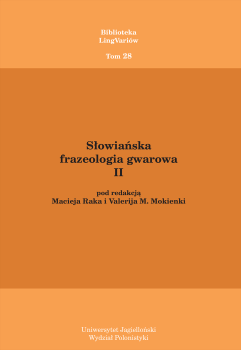Dialektnaâ i istoričeskaâ frazeologiâ: Perspektivy vzaimodejstviâ
Streszczenie
DIALECTIC AND HISTORICAL PHRASEOLOGY: PROSPECTS FOR INTERACTION
The article analyzes the common problems of dialect and historical phraseology in Slavic languages. Compared with the great achievements of Slavic etymology and the publication of capital etymological dictionaries of Slavic languages, historical and etymological studies of phraseology look much more modest. Work in this direction is nevertheless ongoing: several dictionaries (for example, Russian and Belarusian phraseology) and bibliographic reference books (Ukrainian, Bulgarian, Croatian, Czech) have already been created. Studies of dialect phraseology and dialectography are also not as numerous as the description and lexicography of dialect vocabulary. The perspective here is a more detailed study of phraseological dialecticisms of various areas of Slavia and the disclosure of their internal form. At the same time, reliance on the classical collections of Slavic paremiology is needed, an overview of which is given in the article. An example of historical and comparative analysis of phraseological dialecticism is also offered here: Rus. не знала баба горя, купила баба порося – Belar. He мела баба клопату, купіла парася – Ukr. Не мала баба клопоту, так купила порося – Pol. Nie miała baba kłopotu, kupiła sobie prosię – Bulg. Нямала баба работа, та си купила прасенце – Czech Neměla bába trampoty, koupila si prase; Serb. Немала баба беса, него купила прасе etc. The areal, cultural, ideographic, and lexicographical aspects of the study of dialect phraseology seem especially promising to the author of the article.





